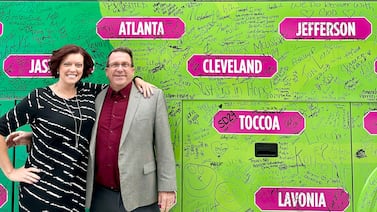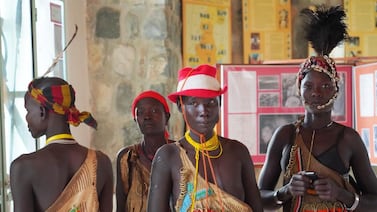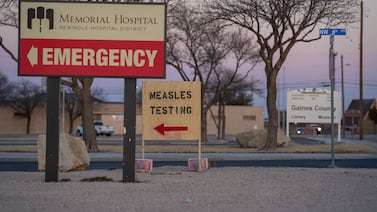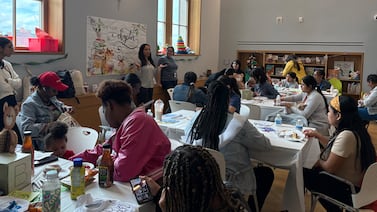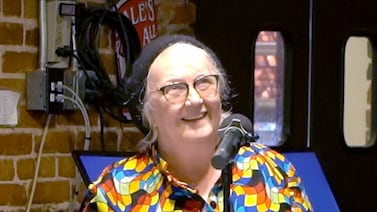Public health, explained: Sign up to receive Healthbeat’s free Atlanta newsletter here.
Maha Mousnad doesn’t let much keep her down. Not a long journey to the United States or the arduous process of becoming a registered nurse here. Not the fact that her family is living in the midst of a civil war in Sudan, nor the start of a global pandemic a month after she landed on U.S. soil.
Rather, Mousnad’s sunny disposition and faith in a better future have driven her from the streets of Khartoum to Clarkston, Georgia. And it’s been a banner year for the 38-year-old. In 2025, she managed to become a U.S. citizen and pass a licensing exam so she can practice as a registered nurse at her beloved Mosaic Health Center.
Mousnad had a successful career back in Khartoum, even teaching nursing. Married with three children, she lived near her parents and brothers. But she wanted something more.
“For me and the people I know, America is one of the big dreams,” Mousnad said. “When we come in USA, we’re looking for home.”
Last year, nearly 60,000 foreign-trained nurses took the National Council Licensure Examination to qualify as registered nurses in the United States. There’s a shortage of RNs across the country, with Georgia needing to train 772 more RNs annually to keep up with projected demand, according to the Georgia Center for Nursing Excellence. Mousnad’s journey from Khartoum to Clarkston shows how foreign-trained nurses can help plug that gap.
Her infectious smiles, can-do attitude, and personal experiences navigating the path to the “American dream” have sparked a loyal following among patients at Mosaic, where she speaks to Arab immigrants in their native language, breaks down scary medical information into simple terms, and provides those most essential elements of good medical care: time and understanding.
Praying for a visa, then knocking on doors
Back in Khartoum, her daily 4 p.m. bus ride was her time to pray: “Yah Allah lottery” – let her family land a visa to the United States. The diversity immigrant visa program awards about 50,000 visas each year to randomly selected applicants from countries with low rates of immigration to the United States. Mousnad was so committed that even her friends were praying for her, she said.
Finally, her family won a visa through the lottery. Soon after they arrived in eastern Maryland in 2020, the country shut down for the Covid pandemic.
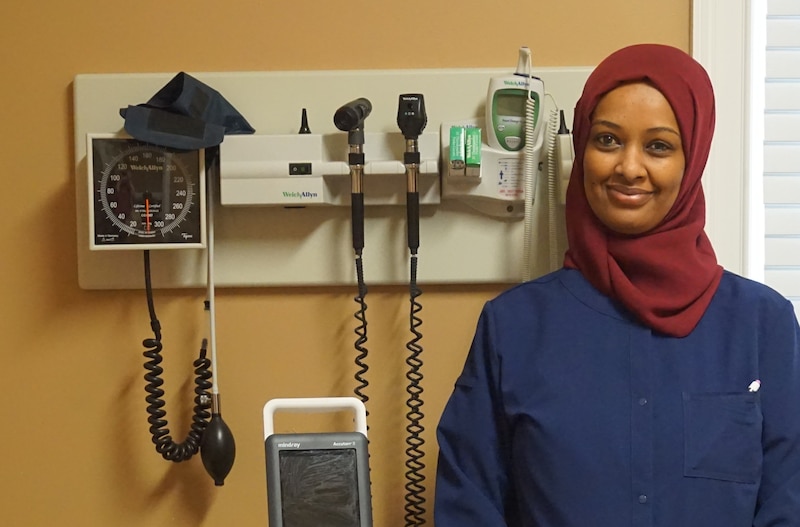
That didn’t stop Mousnad: She knocked on the door of a local hospital, where only a window opened due to the pandemic. Mousnad said she’d been a nurse in Sudan and was offered a new job as a medical assistant. She devoted herself to learning English and soon became a certified nursing assistant.
While working in the hospital, other international nurses told her there were steps she could take to become an RN in the United States. Many elements of her degree transferred, but she needed to take the NCLEX to get her license.
In the meantime, her husband got a job in Atlanta, where Mousnad visited the public library in Clarkston daily, looking for jobs. An internet search revealed that Mosaic Health Clinic – then called the Clarkston Clinic – was just two minutes away.
Again, Mousnad knocked on a door. Shortly thereafter, she was hired at Mosaic.
“You have to move, find the way, and if this door [does] not open for you, of course, the other door can open for you,” Mousnad said.
Mousnad’s relationship with the clinic grew strong. She tried to pass the NCLEX once but failed, like more than half of this year’s first-time test takers who were educated abroad. So Mosaic’s executive director Jeremy Cole lined up nursing professors to help her prepare to take the exam again. It was a no-brainer, he said, because Mousnad and other team members embody “what is best about our nation in all of its diversity.”
Beth Ann Swan, a professor at Emory University School of Nursing, stepped in. She wanted to help Mousnad for professional and personal reasons. The Mosaic Clinic has a close relationship with Emory, and Mousnad helps guide Emory students as they learn to be nurses.
Personally, Swan had been mentored by two foreign-born nurses early in her career (Mrs. Cho and Mrs. Cherian), so when asked to help Mousnad, “the only response was yes, absolutely!” With the help of Swan and another instructor, Sharon Mingo, Mousnad passed the NCLEX in April, three months after she became a U.S. citizen.
Mousnad, in turn, has found many ways to pay it forward. She founded three What’s App groups – along with fellow nurses – to help foreign nurses who face the same challenges she did. One sends practice questions out to help Arabic speakers prepare. Others help demystify the process of becoming a nurse and finding a job.
Mousnad bridges a gap for Arabic-speaking patients
Meanwhile, at the Mosaic Health Center, which provides health care to uninsured people in Clarkston, one of the most diverse neighborhoods in the United States, Mousnad has built a following among her patients, whom she calls “my people.”
The clinic is on track to provide 500 to 600 more visits this year than last, Cole said. Mousnad said many Sudanese people have started coming, learning about it through word of mouth, and she has many Arabic-speaking patients from Syria and Iraq as well.
Mousnad helps them bridge cultural differences in health care. She said many patients lack information, especially about chronic conditions like hypertension, heart disease, and diabetes. That and a desire to turn to traditional remedies is a commonalty between her patients at Mosaic and her patients back in Sudan, she said.
When Mousnad encounters patients at Mosaic who are skeptical of allopathic medicine, she spends a lot of time counseling them in simple language. She said it’s important that she can speak to them in Arabic.
“When you see someone like you, it’s really more comfort for them,” Mousnad said. “They believe on me.” Patients come and ask for her by name. “‘Where is Maha?’” one asked, she said, insisting only Mousnad would do: “‘I will wait.’”
Mosaic’s staff members often make follow-up calls to patients to check on them and ensure they are taking their medications, Mousnad said, reflecting what Cole said is a belief at Mosaic that health care is “transformational not transactional.”
Mousnad said what many of her patients need right now is mental health support because they are facing anxieties over their immigration status, as well as economic strains.
“Our patients now, they need more psychological support and anxiety, stress relief and depression, because normally per day, we have one or two patients, they stay here four or five hours just for crying,” Mousnad said.
As an immigrant herself, she understands just how much stock many have put in the American dream.
“They live in the country a long time, they come here with big dreams,” Mousnad said. “It’s really hard and painful for them” to fear losing that, whether for reasons related to immigration status or job loss.
Cole agreed, saying “there is a significant amount of fear and uncertainty in this community.”
Mousnad said in that context, Mosaic’s commitment to caring for its patients as whole people is what keeps them coming back.
“We are not like any other facility. We give the patient time,” Mousnad said. “They want someone [to] listen to them, hear them, advise them, love them like we are.”
Rebecca Grapevine is a reporter covering public health in Atlanta for Healthbeat. Contact Rebecca at rgrapevine@healthbeat.org.

